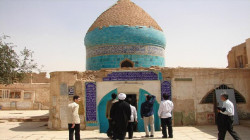Teenager found dead in apparent suicide in Nasiriyah amid suspicions of links to banned religious group

Shafaq News/ Iraqi authorities are investigating the death of a teenager who was found dead in an apparent suicide in the southern city of Nasiriyah on Friday, a security source told Shafaq News Agency.
The source said the body of the under-20-year-old was discovered hanging inside his home in central Nasiriyah, the capital of Dhi Qar. The motive for the suicide remains unclear.
"Investigations are ongoing to determine if the victim had any links to the Qurban group," the source added, referring to an extremist religious sect accused of inciting suicide among young people.
Last Saturday, Iraq's National Security Service announced the arrest of 39 suspects linked to an outlawed religious movement known as the Qurban Group, or "Sacrificers" in English, in a security campaign in four governorates in central and southern Iraq.
The group, which emerged several years ago before going underground, has since resurfaced, prompting a major security operation to apprehend its members, who allegedly carry out ritualistic suicide as an act of devotion and worship.
Four individuals were arrested in Wasit after Iraqi forces received intelligence indicating the presence of suspects there, according to a statement.
Some 35 more suspects were also arrested in the governorates of Basrah, al-Muthanna, and al-Diwaniyah, the statement added.
The group, which emerged during the lifetime of late religious leader Mohammed Mohammed Sadiq al-Sadr, has been criminalized by Iraqi law over its harmful rituals.
Despite its historical roots, al-Sadr distanced himself from the group due to its extreme practices. His son, prominent Shiite cleric Muqtada al-Sadr, has previously disavowed similar mystical groups due to their nonconformist practices.
The approximately 2,500-strong group has developed a cult-like following among young individuals in Iraq, particularly in the southern regions of Wasit, Basrah, and Dhi Qar.
While largely limited to Iraq's southern governorates, some observers suggest that the group's beliefs are inspired by Iranian religious movements that allegedly promote the spiritual primacy of Imam Ali bin Abi Talib.





